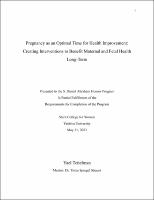Please use this identifier to cite or link to this item:
https://hdl.handle.net/20.500.12202/9033| Title: | Pregnancy as an optimal time for health improvement: Creating interventions to benefit maternal and fetal health long-term |
| Authors: | Strauss, Tirtza Spiegel Teitelman, Yael |
| Keywords: | healthcare crisis pregnancy gestation cervical cancer diabetes evidenced-based interventions alcohol consumption smoking cessation primary and secondary prevention measures health improvement |
| Issue Date: | 21-May-2023 |
| Publisher: | Yeshiva University |
| Citation: | Teitelman, Y. (2023, May 21). Pregnancy as an optimal time for health improvement: Creating interventions to benefit maternal and fetal health long-term [Unpublished undergraduate honors thesis]. Yeshiva University. |
| Series/Report no.: | S. Daniel Abraham Honors Program;May 21, 2023 |
| Abstract: | America is experiencing a major healthcare crisis. Stroke, heart disease, diabetes, and cancer are common diseases that contribute to both the morbidity and mortality rate in the United States. Primary and secondary prevention measures include healthy eating, exercise, vaccinations, and screening for disease. Annual “well-woman visits'' provide an opportunity to address these measures. However, only 73% of women have attended a routine visit in the last two years1. Pregnancy is an optimal time for women to improve their health. The recommended number of outpatient visits in pregnancy is 11 by 36 weeks of gestation followed by additional weekly visits until childbirth2. Each visit presents an opportunity for health education, motivational interviewing to promote positive health habits, vaccination, and to screen for diseases ranging from cervical cancer to diabetes. Additionally, pregnant women are often motivated to promote their health for fetal benefit3. Pregnancy is an optimal time for women to undergo interventions to improve their overall health and prevent disease. Previous successful evidenced-based interventions, including studies aimed at limiting alcohol consumption and smoking during pregnancy, can be used as a starting point for creating new interventions to educate women on primary and secondary prevention measures and assist them in implementation into their lives. |
| Description: | Undergraduate honors thesis / Open access |
| URI: | https://hdl.handle.net/20.500.12202/9033 |
| Appears in Collections: | S. Daniel Abraham Honors Student Theses |
Files in This Item:
| File | Description | Size | Format | |
|---|---|---|---|---|
| Yael Teitelman SCW Honors Thesis.pdf | 248.35 kB | Adobe PDF |  View/Open |
This item is licensed under a Creative Commons License

